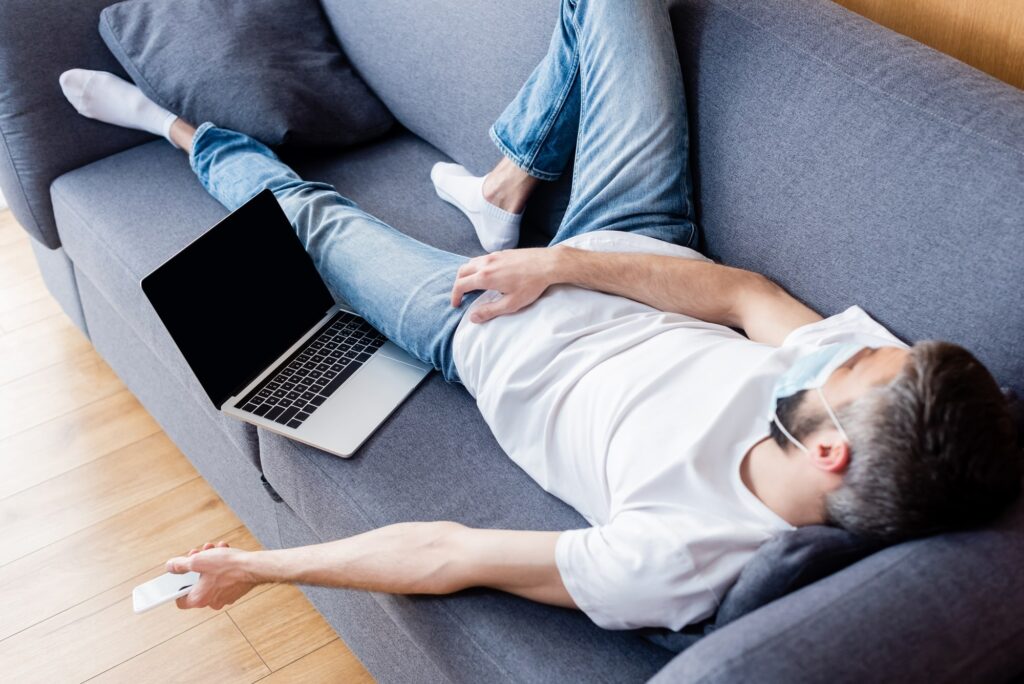COVID and sleep – what are the effects?
We all know that the COVID-19 pandemic has turned the world upside down, but how has it affected sleep?

Increased sleep problems
Not long after the pandemic began, we wrote a post about how COVID-19 had impacted sleep patterns. According to the research back then, many people were sleeping a bit longer than usual as a result of working from home during lockdowns and saving time on commuting.
However, the news wasn’t all good. Quality of sleep had deteriorated. A large number of people found it hard to get to sleep and stay asleep, and even developed insomnia. Many reported having vivid dreams and nightmares, recurring dreams and dreams with elaborate storylines.
We’re now into the third year of this pandemic. Unfortunately, sleep issues continue to be a factor for many people, especially for those who have been unlucky enough to be infected with the virus.
Sleep in COVID patients
Many of those who recover from COVID report that their sleep is different to what it was before they became sick. Problems such as having trouble falling and staying asleep are common. Others find they wake up earlier than usual and can’t get back to sleep, while some find that they don’t feel refreshed in the morning.
COVID and sleep in hospitalised patients
Research has confirmed that people with COVID do indeed suffer from sleep problems. One study found that those patients who were hospitalised with their illness were 5 times more likely to suffer from total sleep deprivation than non-COVID patients.
There are several theories relating to this:
- Lack of natural daylight (from being in a hospital ward) interferes with the production of melatonin, the hormone that helps us feel sleepy
- Medications provided to the patient may impact their sleep
- Hospitals are noisy environments which can make it difficult to sleep
- Sleeping in a hospital bed is not as comfortable as your own
Sleep in COVID patients at home
While it’s easier to sleep in your own bed, many COVID patients still experience sleep difficulties at home. Reasons for this include:
- Symptoms of the virus (e.g. cough and fever) can make it harder to sleep
- Fatigue often associated with COVID-19 increases the likelihood of daytime napping which can interfere with nighttime sleep
- Increased stress and anxiety during times of illness can make it harder to sleep
Unfortunately, sleep disturbances often occur while people recover from COVID, impacting their physical and mental quality of life, and making recovery take longer. As sleep is one of life’s great healers, it’s important to address sleep issues during a pandemic.
Tips to improve your sleep
- Go outside during the day and expose yourself to natural light
- Stick to a good bedtime routine
- Limit your nap times and avoid napping in the afternoon
- Disengage from electronic devices at least an hour before bedtime
- Avoid caffeine and alcohol as they can act as a stimulant
- Reserve your bedroom for sleep and intimacy only
- Avoid eating and drinking large amounts in the evening.
Of course, having a sleep-friendly environment will also help. This means ensuring your bedroom is dark enough, not too hot or cold, and that your bed is comfortable and supportive.
At BedGuard, we have a range of comfortable, supportive mattresses to suit everyone in the family. Browse online or come in-store to find out more.
Of course, if your symptoms continue and the quality and quantity of your sleep don’t improve, visit your doctor.





